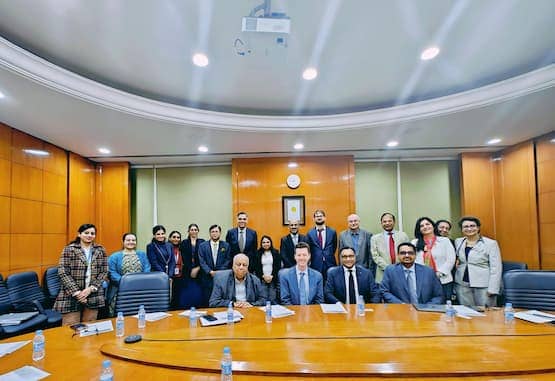Researchers from Monash University have connected experts from India and Australia to help improve the quality of life for people affected by sleep disorders.
Summary: A roundtable meeting was held at Indraprastha Apollo Hospitals in New Delhi to establish the Australia-India Sleep Health Collaborative Initiative, a new effort to tackle sleep health challenges in both countries. The initiative aims to address sleep disorders such as insomnia, obstructive sleep apnea (OSA), and circadian rhythm disorders by integrating Ayurvedic principles with modern sleep medicine practices. Key figures in sleep research, including professor Shantha Rajaratnam and professor Garun Hamilton from Monash University, were involved in the discussions. The initiative focuses on developing personalized, non-pharmacological care models and promoting the implementation of sleep medicine clinics in India, addressing the growing public health issue of sleep disorders.
Key Takeaways:
- Collaboration to Address Sleep Disorders: The Australia-India Sleep Health Collaborative Initiative seeks to foster bilateral relationships and address challenges in sleep health through research and the development of sleep medicine clinics in India.
- Integration of Ayurvedic and Modern Practices: The initiative explores the integration of traditional Ayurvedic practices, such as lifestyle changes and herbal remedies, with modern sleep medicine to improve outcomes for patients with sleep disorders.
- Growing Public Health Crisis: With millions affected by sleep disorders, including insomnia and OSA, the initiative highlights the need for personalized healthcare models and evidence-based treatments to address this widespread issue.
Sleep researchers, physicians, representatives from professional sleep medicine associations, and delegates from Apollo Hospitals met at a roundtable at Indraprastha Apollo Hospitals, New Delhi, to strengthen engagement in health research.
The group will establish the Australia-India Sleep Health Collaborative Initiative to foster bilateral relationships and address mutual challenges in sleep health by promoting the implementation of sleep medicine clinics in India. There will also be a focus on developing innovative care models that integrate Ayurvedic principles with modern practices.
Professor Shantha Rajaratnam, PhD, professor of sleep and circadian medicine, head of the School of Psychological Sciences, Monash University, Australia, co-hosted the meeting with Apollo Hospitals. Clinical professor Garun Hamilton, PhD, respiratory and sleep disorders physician at Monash Health, was also in attendance.
Global Collaboration to Tackle Sleep Disorders
Rajaratnam says this collaborative and integrative approach presents a unique opportunity to address sleep disorders, such as insomnia and obstructive sleep apnea (OSA), and circadian rhythm disorders, on a global scale.
“This roundtable will strengthen Australia-India engagement in sleep and circadian health research by establishing a network of experts from both countries to facilitate ongoing collaboration and knowledge exchange,” says Rajaratnam in a release. “Addressing this growing public health crisis requires a multifaceted approach. There is an urgent need for personalized healthcare models and evidence-based, non-pharmacological treatments.
“This underscores the profound impact of sleep and circadian rhythm disturbances on overall health and mortality risk, and the importance of including sleep health as a core component of a preventive health framework.”
Other key outcomes of the discussions identified priority areas for collaborative research initiatives in sleep and circadian medicine, leveraging the diverse expertise of academics, physicians, healthcare providers, and industry professionals from both countries.
Professor Anupam Sibal, MD, group medical director at Apollo Hospitals; Lt. Gen Dr Bipin Puri, director of medical services at Indraprastha Apollo Hospitals, New Delhi, along with their experts from sleep medicine and Apollo Clinical Innovation Group co-hosted this roundtable discussion meeting.
Ayurvedic Approaches with Modern Sleep and Circadian Medicine
There has been growing interest in integrating traditional Ayurvedic approaches with modern sleep medicine, according to a release from Monash University. Ayurveda is founded on a holistic approach to health and illness, considering them as outcomes of the intricate interaction between physical, physiological, spiritual, and environmental factors.
Its focus on prevention, health promotion, and personalized care aligns closely with modern healthcare perspectives, which have shifted from merely managing diseases to emphasizing health promotion and disease prevention. This holistic perspective aligns well with the complex, multifactorial nature of sleep disorders, according to the university’s release.
Ayurvedic practices such as lifestyle modifications, dietary recommendations, and herbal remedies may complement conventional treatments, potentially improving outcomes.
Why Is This Collaboration So Important?
Research has shown that insufficient sleep is a critical public health concern with far-reaching consequences. Reduced sleep duration is associated with at least seven of the 15 leading causes of death, including cardiovascular disease, hypertension, diabetes, cerebrovascular disease, malignant neoplasms, septicemia, and accidents.
In India, sleep disorders have reached alarming levels, with recent studies indicating a substantial burden of insomnia and OSA. Estimates suggest that approximately 52 million Indians of working age have OSA, with 29 million experiencing moderate-to-severe cases.
Compounding this issue, an estimated 37% of older adults in India experience insomnia highlighting the widespread nature of sleep disturbances across age groups.
Photo caption: Sleep researchers from Monash University, representatives from professional sleep medicine associations, and delegates from Apollo Hospitals met at a roundtable in New Delhi to establish the Australia-India Sleep Health Collaborative Initiative.
Photo credit: Monash University









